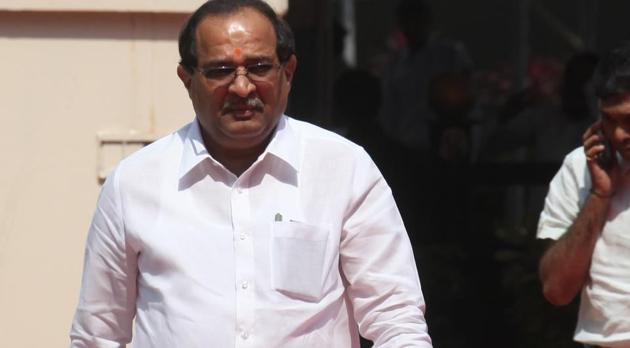A quid pro quo to break the Cong-NCP backbone?
Radhakrishna Vikhe Patil’s appointment to the housing department isn’t really a big comedown
Soon after the Maharashtra cabinet expansion, a fellow journalist critical of how Radhakrishna Vikhe Patil had conducted himself, asked me, “What on earth is he going to get out of the housing department? He was agriculture minister in the Prithviraj Chavan cabinet and the leader of Opposition in the Congress. Isn’t it a big comedown as a housing minister?”

Well, not really. To understand, one must go back to the late 1990s and the era of the late Shiv Sena chief Bal Thackeray, who was more honest and unafraid of admitting to quid pro quos than the present regimes and leaders are.
Vikhe Patil’s father Balasaheb had joined the Shiv Sena and even been adjusted as a minister in the cabinet of the then Prime Minister Atal Bihari Vajpayee, as the minister of state for finance. Those were the times when the BJP accorded more respect to the Shiv Sena and gave it some crucial ministries, instead of just the standard face-saver of the heavy industries ministry, the singular ministry that is afforded to the Sena these days.
Thackeray at the time was frank about why he had admitted Congress stalwarts like Vikhe Patil and Sureshdada Jain into his party – he got access to their money and they got the power and its trappings to protect their vast co-operative empires.
Congressmen in the undivided party then had been under tremendous pressure from the first Shiv Sena-BJP regime in Maharashtra which tried to break their stranglehold over the co-operatives, particularly in western Maharashtra. The sugar co-operatives were always the backbone of the Congress and the only reason why the state unit survived the first central split in the 1960s and then in 1978 when Sharad Pawar formed his Progressive Democratic Front government after breaking the state unit.
Post-Emergency particularly, the Congress lost many state assemblies, but Maharashtra continued to cling to the party and that was entirely owing to the sugar co-operatives. It took Pawar’s internal manipulations and self-serving interests in the absence of a strong leadership at the Centre for the Congress to finally lose Maharashtra to the saffron forces.
But by now both – Thackeray and the BJP leaders – had recognised that they must break the party’s grip over the co-operatives to completely decimate it in Maharashtra. However, although both – Gopinath Munde and Pramod Mahajan – tried hard through the state and the Central governments, they could not quite overcome Pawar, who by now had replaced the Vikhe Patils as the mainstay of the co-operative movement in the state. Pawar was too connected with even the BJP regime at the Centre to allow the plans of the state leaders to succeed.
However, Bal Thackeray had a better idea – what you couldn’t get through force, you might as well try to appropriate through, well, co-operation. Moreover, then as even now, understanding how the co-operative movements work is beyond the comprehension of the BJP and the Shiv Sena. The BJP, particularly, has tried but failed in most of these enterprises using their co-operative banks, particularly purely as small-time financing bodies (giving out loans for cars and housing etc) and unable to make the connection between agriculture and industry and overall economic health of the country even to this day.
So when, in 1996, Jain crossed over to the Shiv Sena and I asked Thackeray, he minced no words in saying, he got money out of the banks, educational institutes and other co-operative institutes run by Jain and Vikhe Patil plus the votes of the people indebted to them, while they got to protect their turf with ministerial berths in government – Vikhe Patil with finance at the Centre and Jain with a specially-created commerce department in the state (nothing like that had existed in Maharashtra before and became defunct after the Sena-BJP went out of power in 1999).
By comparison, though, Radhakrishna has got a department that has no bearing on his vast family empire and he will hardly be able to do the things that both his father and Jain did to guard their respective turfs against predators both in government and out of it. However, given how both Sharad Pawar (note both Balasaheb Vikhe Patil and Jain had joined the Shiv Sena against Pawar and not the Congress) and state Congress president Ashok Chavan tried to decimate their empire this Lok Sabha election by playing games against the Vikhe Patils, it might be enough to just hang on to the trappings of power and take on the enemies that were within from the other side of the battlefield.
As for the Congress-NCP, their backbone might be already broken.




